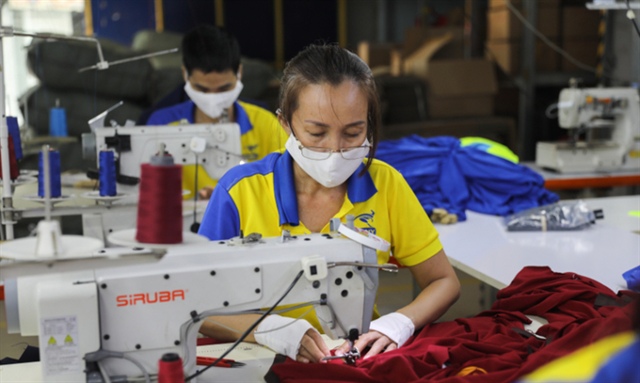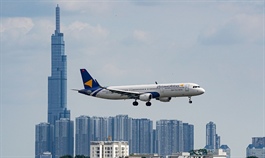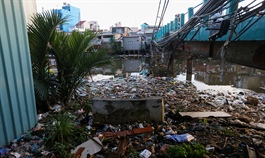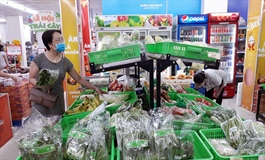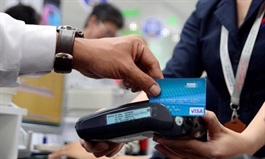Vietnam should prioritize domestic borrowing over foreign to fund recovery: Expert
Vietnam should prioritize domestic borrowing over foreign to fund recovery: Expert
Vietnam should mobilize resources internally to fund economic recovery instead of getting foreign loans, a former acting chairman of the National Financial Supervisory Commission says.
Workers at a garment factory in Ho Chi Minh City, October 2021. Photo by VnExpress/Quynh Tran |
To have enough resources to support the economy, the country needs to diversify its methods, mobilizing public money, borrowing from foreign financial institutions and temporarily using unspent investment money and foreign exchange reserves like other countries have done for their economic stimulus program, former acting chairman of the National Financial Supervisory Commission Truong Van Phuoc said.
However, at this time, mobilizing domestic resources in both dong and foreign currencies is the optimal solution. "Issuing domestic bonds will help us repay principal and interest more proactively."
Finance Minister Ho Duc Phoc recently mentioned the possibility of mobilizing VND180 trillion ($7.8 billion) from the public through the issuance of bonds for the economic recovery package.
International borrowing creates a long-term obligation to pay interest and principal in foreign currencies, pressurizing the nation’s finances. Part of the current public debt includes foreign loans. If Vietnam issues bonds in the domestic market, it can pay interest and principal in dong.
Even with [domestic] bonds in foreign currencies, though interest and principal will be paid in USD, that foreign exchange can return to the banking system or circulate in the national financial system, he explained.
Vietnam can mobilize foreign currencies from local people as foreign exchange has accumulated for many years in the Vietnamese economy. Since the 2000s, US$3-4 billion in remittances flowed into Vietnam every year, also increasing year after year. Remittances are expected to reach $20 billion this year, Phuoc said.
Vietnam is a major destination for foreign direct investment and portfolio investment, and so has a large foreign currency surplus.
"I think the amount of idle money in the economy is fairly large. Instead of keeping USD at home or depositing it in banks at zero percent interest, many people will buy government bonds in foreign currencies with an annual interest rate of around 2 percent," he said. "Financial institutions can also consider this because interest rates on loans in USD in the global market are very low now."
Vietnam could use its foreign exchange reserves for economic recovery programs, but it should consider this the last resort, Phuoc noted. The country has nearly $100 billion in foreign exchange reserves.
The economy grew by 5.64 percent year-on-year in the first half of the year, but contracted by 6.17 percent in the third quarter as the fourth wave of Covid raged, leading to a growth of 1.42 percent for the first nine months, according to the Ministry of Planning and Investment.
The government targets economic growth of 6-6.5 percent in 2022 despite the potential challenges posed by the Covid-19 pandemic.


